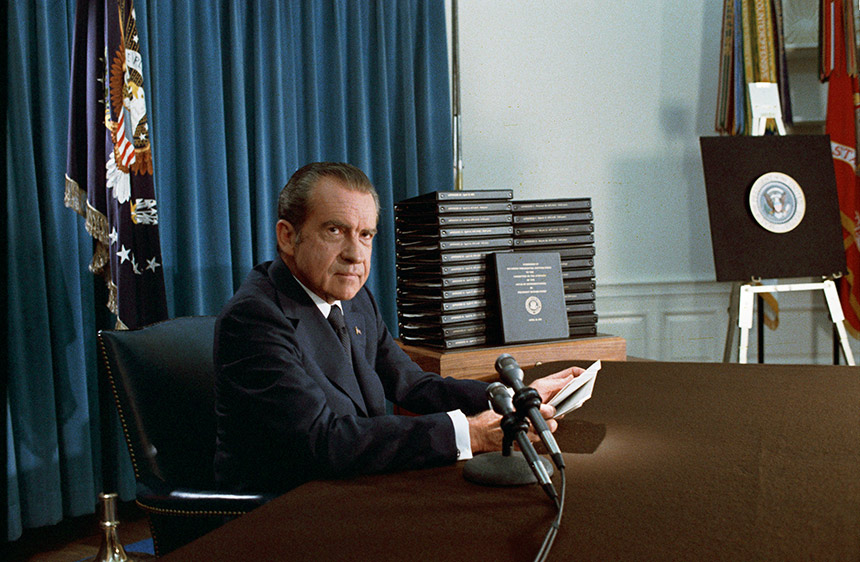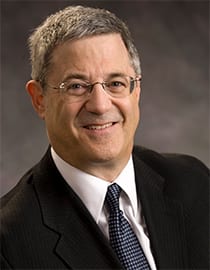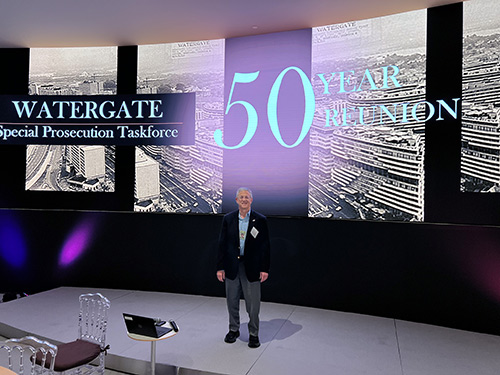
By Gwyneth K. Shaw
For 40 years, Lecturer in Residence Henry Hecht has been a Berkeley Law fixture, blazing a trail for experiential learning and teaching countless students the intricate skills of negotiating, client interviewing, and deposing witnesses.
But a decade before he joined the faculty in 1983, Hecht was a freshly minted Harvard Law graduate who hadn’t even taken the bar exam when he found himself on the highest-profile legal team of the era: the Watergate Special Prosecution Force (WSPF).

Hecht was there for the famous October 1973 “Saturday Night Massacre,” when President Richard Nixon ordered the firing of Hecht’s boss, Special Prosecutor Archibald Cox, over the resignations of United States Attorney General Elliot Richardson and Deputy Attorney General William Ruckelshaus (Solicitor General Robert Bork, who was third in the chain of command, finally carried out the termination.)
Firing Cox didn’t stop the task force, though, and Hecht stayed on through investigations and grand jury proceedings and, ultimately, indictments against some of Nixon’s aides and attorneys.
Now, in an essay written for the forthcoming book Legal Briefs: The Ups and Downs of Life in the Law, Hecht recounts his brushes with Nixon over four episodes — divulging some details publicly for the first time.
The book, edited by WSPF colleague Roger Witten, will be published April 30, and features several members of the task force. But it’s not a “Watergate book,” Hecht says, and indeed the essay topics range widely, from D.C. insider tales of the Iran hostage crisis and the 9/11 Commission to personal accounts of lawyers looking back on their important cases.
A fun challenge
Besides Hecht and Witten, there are 18 other authors, including former Harvard Law Dean Martha Minow and former Federal Election Commission Chair Trevor Potter.
“I got involved because Roger called me and said, ‘I’ve got this project. I’m trying to get a number of people to write an essay that would be interesting and fun for them to write,’” Hecht says.
Hecht describes his chapter as a personal story about some of the hidden corners of the Watergate investigation. It’s sprinkled with self-deprecating humor of the driest variety, humble even in recounting moments that rocked the world.

“I enjoyed the process,” says Hecht, who’s a Herma Hill Kay Lecturer in Residence at Berkeley Law. “It was really fun to tell stories that were meaningful to me.”
“Richard Nixon and Me” starts with a quick, inadvertent interaction: After graduating from law school, Hecht was hired by the federal Office of Economic Opportunity (OEO) to work in the Office of Training within the Legal Services Corporation.
“Then-President Richard Nixon intervened in my life for the first, but not the only time,” Hecht writes. “(Nixon) was determined to dismantle the OEO by defunding its programs. Although a federal judge later ruled that Nixon’s effort was ‘unauthorized by law, illegal, and in excess of statutory authority,’ this ruling came too late to save my job.
“The Office of Training had already been defunded.”
A front-row seat to history
Not long after, Hecht read in a newspaper that Cox, a Harvard Law professor, had been appointed as the Watergate special prosecutor and wrote to him seeking a job. The letter, Hecht writes, “was in retrospect rather naive,” but he got the appointment and began in June 1973 as the team’s youngest member and the only person hired straight out of law school. (He passed the bar exam that summer and was sworn in by fall. Hecht notes that Cox’s secretary brought in a celebratory cake.)
Now able to appear before the Watergate grand jury, Hecht’s essay recounts three other Nixon encounters, all related to the presidential scandal and investigation. The most direct was when he questioned a post-resignation Nixon at his home in California in 1975, as part of a probe into the propriety of a tax deduction Nixon took after donating his vice presidential papers to the National Archives.
Two members of the Watergate grand jury attended as representatives of the larger panel and heard Nixon’s testimony, Hecht writes. (Under a special agreement, Nixon’s attorneys were allowed to sit in during the questioning.) Nixon inquired whether he was related to a family that owned The Hecht Company, a Washington, D.C.-area department store chain.
“It seemed to me that the ex-president was still using his political skills to try to make a personal connection with me, the Assistant Special Prosecutor who was examining him,” Hecht writes. “In this third episode involving President Nixon and me, he did not take any action that would leave me jobless.”
Hecht kept that testimony secret for 36 years, he says, until it was released in 2011 under a Freedom of Information Act request.
The fourth and final anecdote in the essay explores a bleaker moment in Hecht’s Watergate work: When a judge threw out an indictment against Frank DeMarco Jr., Nixon’s personal attorney, because he ruled Hecht’s team hadn’t disclosed potentially exculpatory information to DeMarco’s lawyers. Hecht’s handwritten notes of the task force interview with DeMarco were scrutinized by the judge — and his involvement in the incident hit the news.
“I had hoped one day to have my name in the New York Times,” Hecht writes, “but not for being the author of notes that led in part to the dismissal of all charges brought against DeMarco.”
Besides the book, Hecht and his fellow task force members have stayed in touch, and he attended a gathering last fall commemorating the 50th anniversary of the Saturday Night Massacre. He still has some mementos from that time — including a Rolodex still stocked with task force targets like John Dean and John Mitchell.
Almost every day was fascinating, Hecht says, including his time investigating Nixon’s infamous “enemies list.” It provided an incredible proving ground for a young lawyer.
“Once, my team leader and I were interviewing former Attorney General John Mitchell, and Mitchell was talking about what he had and hadn’t done, and it was pretty horrifying,” Hecht says. “And I naively said to him, ‘I just graduated from law school, and I took professional responsibility. I can’t understand how a lawyer could do those things.’ And I was totally sincere. Mitchell said, ‘One day you’ll understand.’”